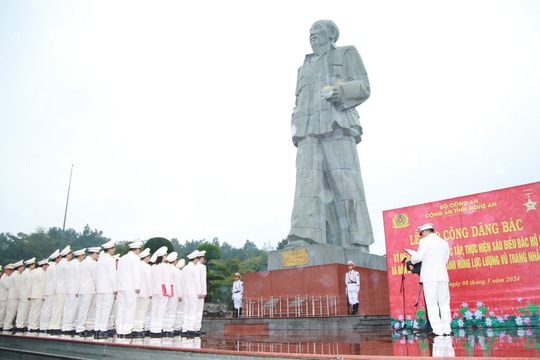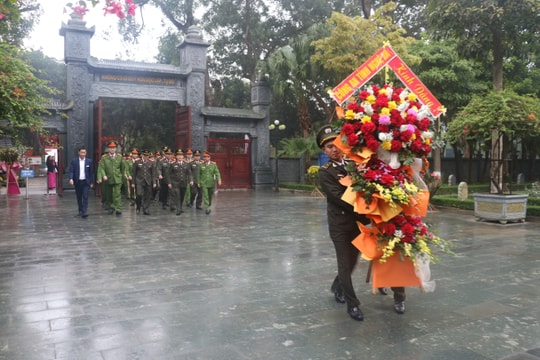Life and career of comrade Tran Quoc Hoan
(Baonghean.vn)- Comrade Tran Quoc Hoan, real name Nguyen Trong Canh, was born on January 23, Binh Thin year (1916), in a poor farming family in Dinh hamlet, Duong Lieu village, Nam Kim commune (now Nam Trung commune, Nam Dan district, Nghe An province), a land rich in cultural and revolutionary traditions.
Born and raised in a country still enslaved, witnessing the miserable life of the people under the domination, oppression and exploitation of the colonial and feudal regimes, patriotic ideology and revolutionary spirit were nurtured in Tran Quoc Hoan from a very early age.
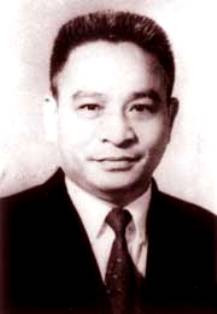 |
| Comrade Tran Quoc Hoan |
While still a student, Tran Quoc Hoan actively responded to the call of the Phuc Viet Association, participated in the struggles of students and people of Nghe An to demand that the French colonialists abolish the death sentence of Phan Boi Chau (in 1925), attended the memorial service of Phan Chu Trinh (in 1926) and fought against the French colonialists' boycott of teacher Ha Huy Tap.
In 1930, Tran Quoc Hoan joined the anti-imperialist student organization of the Indochinese Communist Party. He was trusted by the Duong Lieu village party cell to distribute leaflets, act as a liaison, and enthusiastically participate in rallies and demonstrations with thousands of farmers in the communes, encircling and destroying the Nam Dan district office, the alcohol company, and the prison to free political prisoners.
After participating in revolutionary activities in his hometown, Tran Quoc Hoan decided to leave his family to work as a coolie at the Boneng lead mine (Thà khet-Laos), on the one hand to work to earn a living, on the other hand to have the opportunity to interact with the working class to train himself.
Here, Tran Quoc Hoan was assigned by the Party organization to propagate and mobilize workers and quickly matured from a patriot into a communist. In March 1934, Tran Quoc Hoan was admitted to the Indochinese Communist Party.
At the end of 1934, he was arrested by French secret police and sentenced to 8 months in prison and 5 years of exile. After his prison term, he was placed under house arrest in Ha Tinh. In 1936, Tran Quoc Hoan escaped to Hanoi to participate in the Democratic Front movement, working for many public newspapers of the Party in Hanoi at that time.
From 1937 to 1939, following the Party's Directive, Tran Quoc Hoan withdrew into secret activities, joined the Standing Committee of the City Party Committee as Deputy Secretary and then Secretary of the Hanoi City Party Committee. Being hunted down by the enemy, in May 1940, he was allowed to withdraw from Hanoi, to work at the "Liberation" newspaper printing house, directly writing in reverse on stone for lithography.
At a new location, he continued to direct the printing and distribution of the newspaper "Liberation" which had been founded by comrades Tran Huy Lieu, Vo Nguyen Giap and Dao Duy Ky before. To be consistent with the Party's propaganda work in the new period, the newspaper "Liberation" was renamed "Liberation Flag" by our Party. After working at the press agency for a while, comrade Tran Quoc Hoan was transferred to be in charge of the Traffic Station of the Northern Regional Party Committee, concurrently Head of the Steering Committee for the revolutionary movement of the two provinces of Bac Ninh and Bac Giang.
In early 1941, he was arrested by the French colonialists for the second time and sentenced to 6 years in prison and 20 years of house arrest at Hoa Lo prison (Hanoi), then exiled to Son La prison.
Here, he participated in activities in the prison party cell and in 1944, was elected as Secretary of the prison party cell. After the Japanese coup against the French (March 9, 1945), Tran Quoc Hoan cleverly persuaded the prison guards to release 200 political prisoners, safely withdraw to the Party's operating areas, contributing to supplementing the cadre team for the August Revolution in 1945.
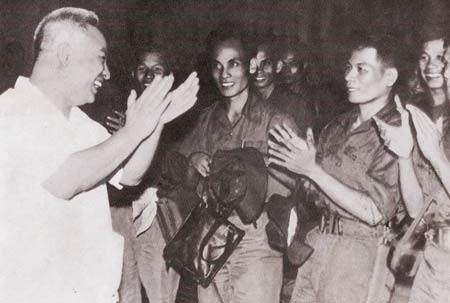 |
| Minister Tran Quoc Hoan visited a police unit before leaving for combat and work in the southern battlefield. |
After being released from prison, he was appointed by the Central Committee as Secretary of the Northern Regional Party Committee. In December 1946, he was appointed as a Central Committee delegate in Hanoi. In 1947, he became Secretary of the Inter-Zone II Party Committee. In March 1948, he became Secretary of the Inter-Zone X Party Committee. In 1949, he became Secretary of the Hanoi Special Zone Party Committee. In 1951, at the Second National Party Congress, he was elected to the Party Central Committee. On August 19, 1952, he was assigned by the Party Central Committee to be in charge of the Public Security sector. On September 6, 1952, he was appointed by President Ho Chi Minh to hold the position of Director of the Vietnam Public Security Department by a decree. In February 1953, he held the position of Deputy Minister of Public Security and then Minister of Public Security (later renamed the Ministry of Interior until 1980).
Since 1954, he was also Secretary of the Hanoi Party Committee, directly organizing the takeover of the capital and transferring the Government and the Party Central Committee from the Viet Bac resistance base to Hanoi.
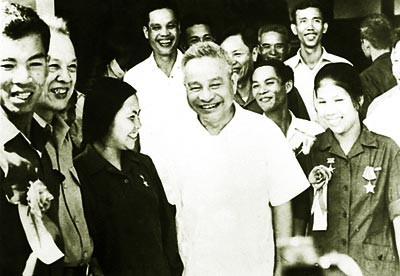 |
| Comrade Tran Quoc Hoan and lawyer Nguyen Huu Tho met intimately with delegates attending the Conference to honor Heroes of the Southern Security Forces. |
In 1960, at the 3rd National Congress of the Party, he was elected to the Party Central Committee and was elected by the Central Committee as an alternate member of the Politburo. In 1972, he was an official member of the Politburo. In 1976, at the 4th National Congress of the Party, he was re-elected to the Party Central Committee and was re-elected by the Central Committee to the Politburo. He was a member of the National Defense Council.
From 1961 to 1984, he participated in the Central Military Commission. At the end of 1980, he was elected by the Central Committee to the Party Central Committee Secretariat. In 1982, at the 5th National Congress of the Party, he was re-elected to the Central Executive Committee and appointed as Head of the Central Committee for Mass Mobilization.
He was a National Assembly delegate from the 2nd to the 7th terms. Due to his great contributions to the revolution, he was awarded many Orders and Medals, including the Gold Star Order - the most noble Order of our Party and State. Due to old age and poor health, in early September 1986, he passed away in Hanoi at the age of 70.
N.Khoa (synthesis)

